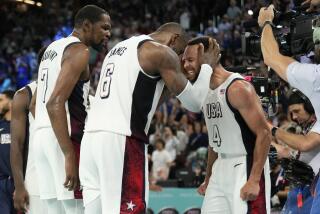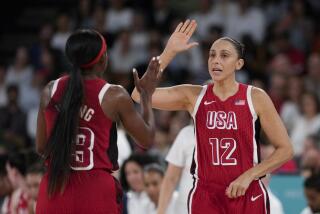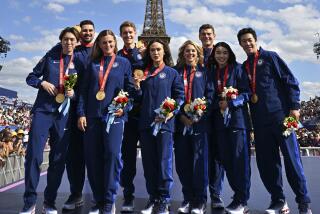U.S. team gets the rock star treatment
- Share via
SHANGHAI -- Bright lights, extremely big city.
If Macao was indistinguishable from Las Vegas, at least from inside the massive Venetian Macao, the U.S. Olympic basketball team’s arrival in this sprawling monument to urbanization, with its spectacular high rises and its estimated 20 million inhabitants, marked the moment the Americans, like Alice, went down the rabbit hole.
En route to Beijing, the U.S. team is spending four days here and playing its final two exhibitions, the first of which was Sunday afternoon’s uneventful 89-68 romp over Russia with Kobe Bryant leading all scorers with 19 points.
The U.S. will play Australia here Tuesday, then go to Beijing, with the opener against China still four more days off on Aug. 10.
“You know, we’ve been looking forward to that for a while,” Bryant said. “We’re very excited about the opportunity. But at the same time, we understand the process of it.
“And that’s part of the enjoyment of it, the hard work we put in, the preparation that we put in, that makes it that much more enjoyable.
“You hear it so many times, it’s cheesy, but the road to redemption, that’s really what it is.
“We understand the journey that we’re on and we want to savor every moment of it.”
The game was the least remarkable thing for the U.S. team here. In all their superstar lives, the American players were never received like this.
Their bus from the airport was preceded down the freeway by a police car with its flasher on as uniformed officers stood in the middle of on-ramps along the way, holding back traffic.
More police guarded the entrance and exit to the team’s five-star hotel downtown in what looks like the local Rodeo Drive. Hotel guests went through metal detectors to enter the marbled lobby, with more police putting anything they carried through airport-style X-ray machines.
Up the elevator to the players’ rooms . . . with more police posted on their floor.
Before they boarded their bus to Sunday’s game, another 10 policemen came up to cordon off onlookers.
The game itself was a yawner. The Americans, who were clearly psyched for Lithuania, a European power that beat the U.S. in Athens in 2004, were clearly not for the Russians, now reduced to a European dark horse.
There was a time when this was the world’s greatest rivalry, but that was when Russia was part of the USSR.
Now the Russian coach is an American, David Blatt, who was born in Boston and played at Princeton. The point guard is another American, J.R. Holden, a 31-year-old unknown from Bucknell who became so big for CSKA Moscow, he was granted Russian citizenship by decree of President Vladimir Putin to get around a rule limiting foreign players.
“Given the history and great tradition between what was the USSR and now is the Russian national team and, of course, the United States team, a game of this nature is always interesting,” Blatt said.
“Thank goodness we live in a time in which sports rules and we can look at the game and enjoy the game on a sporting level without any other agendas going on.”
Unfortunately for the rivalry, the breakup of the Soviet empire cost the national team its best players who were Lithuanian, including Arvydas Sabonis and Sarunas Marciulionis.
Their last game for the USSR was the victory over the U.S. at Seoul in 1988. Afterward, the four Lithuanian members of the team went into a room and took their own team picture.
With Russia rebuilding now, and desperate enough to hire Blatt, who had become prominent while coaching in Israel, the team surprised everyone by winning last summer’s Eurobasket tournament, on a last-second shot by Holden.
“I know the question about playing on the Russian national team for Jay is a very difficult question,” said teammate Nikita Morgunov. “But after the European championship last year, Russian fans said he was the most Russian of anybody.”
Blatt’s disciplined team played a zone defense, which the Americans will see more of since it slows them down and makes them shoot from the outside, which is still the worst thing they do.
The U.S. still won by 21, which was a relative squeaker after they won their first three exhibitions by an average of 41.
“Any time you face the beast and you don’t get eaten,” Blatt said, “you did all right.”
--
More to Read
Go beyond the scoreboard
Get the latest on L.A.'s teams in the daily Sports Report newsletter.
You may occasionally receive promotional content from the Los Angeles Times.






